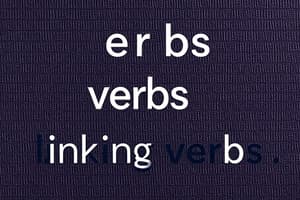Podcast
Questions and Answers
Which sentence demonstrates a linking verb correctly connecting the subject to a predicate adjective?
Which sentence demonstrates a linking verb correctly connecting the subject to a predicate adjective?
- The athlete runs every morning to train.
- The chef tasted the soup carefully.
- He spoke eloquently to the crowd.
- She remained silent throughout the meeting. (correct)
In which of the following sentences does the verb function primarily to describe an action performed by the subject?
In which of the following sentences does the verb function primarily to describe an action performed by the subject?
- The stew tastes delicious.
- He walks to school every day. (correct)
- The results appear promising.
- The flowers smell fragrant.
Which of the following sentences uses a verb in a way that implies a state of being rather than a direct action?
Which of the following sentences uses a verb in a way that implies a state of being rather than a direct action?
- They eagerly awaited the guests.
- He loudly announced his arrival.
- The bread smells yeasty. (correct)
- She quickly painted the fence.
Identify the sentence where the verb serves to connect the subject with additional information about it, rather than detailing an observable action.
Identify the sentence where the verb serves to connect the subject with additional information about it, rather than detailing an observable action.
Which sentence features a verb that bridges the subject to a description or characteristic, instead of illustrating a specific activity?
Which sentence features a verb that bridges the subject to a description or characteristic, instead of illustrating a specific activity?
Flashcards
What is a Verb?
What is a Verb?
A word that describes what the noun in a sentence is doing.
Subject and Predicate
Subject and Predicate
The two main parts of a sentence: who/what the sentence is about.
Action Verb
Action Verb
A verb that describes a specific action performed by the subject.
Linking Verb
Linking Verb
Signup and view all the flashcards
Examples of Linking Verbs
Examples of Linking Verbs
Signup and view all the flashcards
Study Notes
- In English, the four basic types of words are nouns, verbs, adjectives, and adverbs.
- Nouns are the subject of a sentence, usually a person, place, or thing.
- Verbs describe what the noun is doing in the sentence.
- Adjectives and adverbs modify nouns and verbs.
- Every sentence contains a subject and a predicate.
- The subject is what the sentence is about (nouns).
- The predicate describes what the subject is doing (verbs).
- In a basic sentence structure, the subject (noun) comes first, followed by the predicate (verb).
- Sometimes the order is flipped, and the verb precedes the noun, such as in a question.
Action verbs
- Action verbs are the most traditional kind of verb.
- Action verbs describe an action that the subject is doing, did, or will do.
Linking Verbs
- Linking verbs connect a subject noun to a predicate adjective or noun.
- They link two ideas together without describing an action.
- Common linking verbs include: be (am, is, are, was, were), appear, remain, look, feel, stay, turn, become.
Auxiliary Verbs
- Auxiliary verbs, or helping verbs, assist the main verb, which can be an action or linking verb.
- These verbs convey additional information, for example: have, can, should, might, will, did, would.
Comparison of Verb Types
- Action verbs describe actions, while linking verbs connect ideas.
- 'Colin rushes into a burning building' uses the action verb "rushes".
- 'Colin is a fireman' uses the linking verb "is" to connect Colin to fireman.
- There are far fewer linking verbs than action verbs.
- Some verbs can function as either linking or action verbs, such as sensory verbs (looks, tastes, smells, feels).
- Auxiliary verbs modify the mood, tense, or modality of a sentence.
- Linking verbs connect the noun or adjective to the subject for descriptive purposes.
Studying That Suits You
Use AI to generate personalized quizzes and flashcards to suit your learning preferences.
Description
Understand the four basic types of words: nouns, verbs, adjectives, and adverbs. Nouns acts as the subject, verbs describe the noun's actions, and adjectives/adverbs modify them. Sentences consist of a subject (noun) and a predicate (verb), with action and linking verbs playing different roles.




